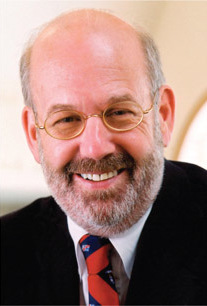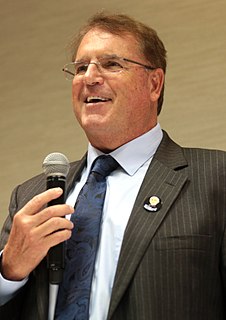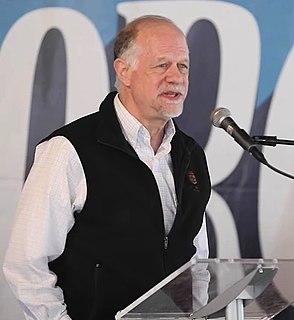Related Research Articles

Gary Kilgore North is an American writer, Austrian School economic historian, and leading figure in the Christian reconstructionist movement. North has authored or coauthored over fifty books on topics including Reformed Protestant theology, economics, and history. He is an Associated Scholar of the Mises Institute.

Psychology is the scientific study of mind and behavior. Psychology includes the study of conscious and unconscious phenomena, including feelings and thoughts. It is an academic discipline of immense scope, crossing the boundaries between the natural and social sciences. Psychologists seek an understanding of the emergent properties of brains, linking the discipline to neuroscience. As a social science, psychologists aim to understand the behavior of individuals and groups. Ψ is a Greek letter which is commonly associated with the science of psychology.

Ronald Ernest Paul is an American author, activist, physician, and retired politician who served as the U.S. representative for Texas's 22nd congressional district from 1976 to 1977 and again from 1979 to 1985, and then for Texas's 14th congressional district from 1997 to 2013. On three occasions, he sought the presidency of the United States: as the Libertarian Party nominee in 1988 and as a candidate for the Republican Party in 2008 and 2012. A self-described constitutionalist, Paul is a critic of the federal government's fiscal policies, especially the existence of the Federal Reserve and the tax policy, as well as the military–industrial complex, the war on drugs, and the war on terror. He has also been a vocal critic of mass surveillance policies such as the USA PATRIOT Act and the NSA surveillance programs. In 1976, Paul formed the Foundation for Rational Economics and Education (FREE), and in 1985 was named the first chairman of the conservative PAC Citizens for a Sound Economy, both free-market groups focused on limited government. He has been characterized as the "intellectual godfather" of the Tea Party movement, a fiscally conservative political movement started in 2009 that is largely against most matters of interventionism.

Personality is the characteristic sets of behaviors, cognitions, and emotional patterns that evolve from biological and environmental factors. While there is no generally agreed upon definition of personality, most theories focus on motivation and psychological interactions with the environment one is surrounded by. Trait-based personality theories, such as those defined by Raymond Cattell, define personality as traits that predict an individual's behavior. On the other hand, more behaviorally-based approaches define personality through learning and habits. Nevertheless, most theories view personality as relatively stable.

Llewellyn Harrison Rockwell Jr. is an American author, editor, and political consultant. A libertarian and a self-professed anarcho-capitalist, he founded and is the chairman of the Mises Institute, a non-profit dedicated to promoting the Austrian School of economics.
Richard Bentall is a Professor of Clinical Psychology at the University of Sheffield in the UK.
Paleolibertarianism was a libertarian political activism strategy. It was developed by American anarcho-capitalist theorists Murray Rothbard and Lew Rockwell in the American political context after the end of Cold War. From 1989 to 1995, they sought to communicate libertarian notions of opposition to government intervention using messages accessible to working and middle-class people of the time. This approach, usually identified as right-wing populism, was intended to radicalize citizens against the state. The name they chose for this style of activism evoked the roots of modern libertarianism, hence the prefix paleo. That founding movement was American classical liberalism, which shared the anti-war and anti–New Deal sentiments of the Old Right in the first half of the 20th century.

Thomas James DiLorenzo is an American economics professor at Loyola University Maryland Sellinger School of Business. He identifies as an adherent of the Austrian School of economics. He is a research fellow at The Independent Institute, a senior fellow of the Ludwig von Mises Institute, Board of Advisors member at CFACT, and an associate of the Abbeville Institute. He holds a Ph.D. in Economics from Virginia Tech.
Behavioral sciences explore the cognitive processes within organisms and the behavioral interactions between organisms in the natural world. It involves the systematic analysis and investigation of human and animal behavior through naturalistic observation, controlled scientific experimentation and mathematical modeling. It attempts to accomplish legitimate, objective conclusions through rigorous formulations and observation. Examples of behavioral sciences include psychology, psychobiology, anthropology, and cognitive science. Generally, behavioral science primarily has shown how human action often seeks to generalize about human behavior as it relates to society and its impact on society as a whole.
Mean world syndrome is a hypothesized cognitive bias wherein people may perceive the world to be more dangerous than it actually is, due to long-term moderate to heavy exposure to violence-related content on mass media.
Affective science is the scientific study of emotion or affect. This includes the study of emotion elicitation, emotional experience and the recognition of emotions in others. Of particular relevance are the nature of feeling, mood, emotionally-driven behaviour, decision-making, attention and self-regulation, as well as the underlying physiology and neuroscience of the emotions.

David Everett Rumelhart was an American psychologist who made many contributions to the formal analysis of human cognition, working primarily within the frameworks of mathematical psychology, symbolic artificial intelligence, and parallel distributed processing. He also admired formal linguistic approaches to cognition, and explored the possibility of formulating a formal grammar to capture the structure of stories.

Lawrence Henry White is an American economics professor at George Mason University who teaches graduate level monetary theory and policy. He is considered an authority on the history and theory of free banking. His writings support the abolition of the Federal Reserve System and the promotion of private and competitive banking.

Burton S. Blumert was the president of the Center for Libertarian Studies in Burlingame, California, co-founder and chairman of the Mises Institute, and the publisher of LewRockwell.com. In a career that spanned almost 50 years until his retirement in 2008, he bought and sold precious metals as the proprietor of Camino Coin Company.
Libertarian conservatism, also referred to as conservative libertarianism and conservatarianism, is a political philosophy that combines conservatism and libertarianism, representing the libertarian wing of conservatism and vice versa.

Walter Edward Block is an American Austrian School economist and anarcho-capitalist theorist. He currently holds the Harold E. Wirth Eminent Scholar Endowed Chair in Economics at the School of Business at Loyola University New Orleans, and is a senior fellow of the non-profit think-tank Ludwig von Mises Institute in Auburn, Alabama. He is best known for his 1976 book Defending the Undefendable, which takes contrarian positions in defending acts which are illegal or disreputable but Block argues are actually victimless crimes or benefit the public.
This is a bibliography of books and other works written by U.S. Congressman Ron Paul.
Shadowstats.com is a website that analyzes and offers alternatives to government economic statistics for the United States. Shadowstats primarily focuses on inflation, but also keeps track of the money supply, unemployment and GDP by utilizing methodologies abandoned by previous administrations from the Clinton era to the Great Depression.
Beginning in 1978, for more than two decades, Ron Paul – American physician, libertarian activist, congressman, and presidential candidate – published a variety of political and investment-oriented newsletters bearing his name. The content of some newsletters, which were widely deemed racist, was a source of controversy during his 1996 congressional campaign and his 2008 and 2012 presidential campaigns.
The relationships between digital media use and mental health have been investigated by various researchers—predominantly psychologists, sociologists, anthropologists, and medical experts—especially since the mid-1990s, after the growth of the World Wide Web. A significant body of research has explored "overuse" phenomena, commonly known as "digital addictions", or "digital dependencies". These phenomena manifest differently in many societies and cultures. Some experts have investigated the benefits of moderate digital media use in various domains, including in mental health, and the treatment of mental health problems with novel technological solutions.